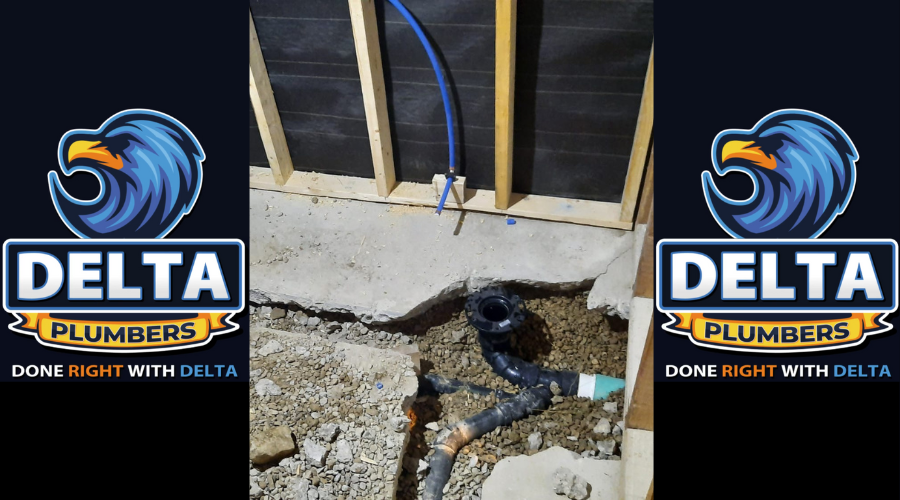Maintaining a smooth and functional drainage system is crucial for any household or business. Clogged drains are a common issue that can cause significant inconvenience if not addressed promptly. While chemical drain cleaners are widely available, they often come with environmental concerns and potential harm to your pipes. Fortunately, there are several natural methods you can use to unclog your drains effectively. In this comprehensive guide, we’ll explore various natural solutions, discuss what plumbers typically use, and provide insights on maintaining clean and clear drains without resorting to harsh chemicals.

Picture Source – Delta Plumbers
What Can You Use Naturally to Unclog a Drain?
Natural drain cleaning methods are not only eco-friendly but also gentle on your plumbing system. Here are some additional natural remedies to consider:
1. Bentonite Clay:
Bentonite clay is known for its absorbent properties, making it useful for drawing out grease and oil buildup in your drains. Mix a small amount of bentonite clay with water to create a thick paste, then apply it to the clogged area. Let it sit for an hour before flushing it away with hot water.
2. Enzymatic Drain Cleaners:
Enzymatic drain cleaners use natural bacteria or enzymes to break down organic materials like hair, soap scum, and food particles. These cleaners are available in stores, but you can also make your own by mixing yeast and sugar with warm water. Pour the solution down the drain and let it sit overnight. The enzymes will work to dissolve the clog naturally.
3. Boiling Water:
Sometimes, the simplest solution is the most effective. Boiling water can help dissolve soap scum, grease, and other debris that may be causing a blockage. Pour boiling water directly into the drain in stages, allowing the hot water to work through the clog.
4. Manual Removal:
If you can see the clog or suspect it’s near the drain’s opening, a simple tool like a wire hanger can help. Straighten out the hanger, leaving a small hook at one end, and carefully insert it into the drain to pull out any blockages. This method works well for hair clogs in bathroom drains.
These natural methods are ideal for minor clogs and regular maintenance. For more severe blockages, you might need to combine these techniques or call in a professional.
Also Read: Faucet Installation: A Comprehensive Guide by Delta Plumbers

Picture Source – Delta Plumbers
What Do Plumbers Use to Unblock Drains?
While natural methods are effective for many clogs, professional plumbers have access to specialized tools and techniques that can handle more stubborn blockages.
1. Plumbing Snake (Auger):
A plumbing snake, or auger, is a flexible, coiled tool that plumbers use to reach deep into pipes to dislodge clogs. It can navigate bends and curves in the plumbing, making it highly effective for reaching blockages that are far from the drain opening.
2. Hydro-Jetting:
Hydro-jetting involves using a high-pressure stream of water to blast away blockages and clean the inside of the pipes. This method is particularly effective for removing grease, sludge, and scale buildup, leaving the pipes clean and clear.
3. Camera Inspection:
To accurately diagnose the cause of a blockage, plumbers may use a small, waterproof camera attached to a flexible cable. This camera allows them to see inside the pipes and identify the exact location and nature of the clog, ensuring that the right method is used to clear it.
4. Biodegradable Drain Cleaners:
Some plumbers may use professional-grade, biodegradable drain cleaners that are stronger than store-bought options but still safe for the environment. These cleaners often contain enzymes or bacteria that break down organic material without damaging the pipes.
5. Manual Tools:
In some cases, plumbers may use manual tools like plungers or handheld augers for smaller, more localized clogs. These tools are often effective for clearing blockages in toilets, sinks, and showers.
By understanding the tools and methods that plumbers use, you can make informed decisions about when to try natural remedies at home and when to call in a professional.
Also Read: Right Plumber for Your Needs: How to Choose Best

Picture Source – Delta Plumbers
What Happens if You Put Too Much Baking Soda Down the Drain?
Baking soda is a versatile and effective natural cleaner, but using too much of it can have unintended consequences.
1. Build-Up in Pipes:
If too much baking soda is used without sufficient water to flush it through the system, it can accumulate in the pipes, potentially leading to a blockage. This is especially true if the baking soda is combined with other materials like grease or hair.
2. Ineffective Results:
While baking soda is great for breaking down minor clogs, it may not be effective for more severe blockages. Using too much in an attempt to clear a stubborn clog could result in wasted time and resources without resolving the issue.
3. Potential Reaction Issues:
Baking soda reacts with acidic substances like vinegar to produce carbon dioxide gas, which creates the fizzing action that helps dislodge clogs. However, if too much baking soda is used, the reaction may not occur evenly, reducing its effectiveness.
4. Risk of Overflows:
If a large amount of baking soda is combined with vinegar or another acidic substance in a confined space, the reaction can produce a significant amount of gas and pressure. In extreme cases, this could lead to an overflow or burst pipes if the pressure is not released properly.
To avoid these issues, it’s essential to use baking soda in moderation and follow it with plenty of hot water to ensure it moves through the pipes smoothly. If you’re dealing with a more severe clog, it might be best to try other methods or consult a professional plumber.
Also Read: Leaking Toilets and Faucets: Fixing Tips from Delta Plumbers

Picture Source – Delta Plumbers
How Do You Clear a Severely Clogged Drain?
Severely clogged drains can be challenging to clear, especially if the blockage is deep within the plumbing system. Here are some methods that can help:
1. Plunger:
A plunger is often the first line of defense against severe clogs. For best results, ensure that there is enough water in the sink or tub to cover the plunger’s head. Create a tight seal around the drain and push the plunger up and down rapidly. The suction and pressure created by the plunger can help dislodge the clog.
2. Baking Soda and Salt:
For a more aggressive approach, try mixing baking soda with salt. Pour half a cup of each down the drain, then let it sit for several hours or overnight. Follow this by flushing the drain with boiling water. The abrasive action of the salt combined with the cleaning power of baking soda can help break up tough clogs.
3. Plumbing Snake (Auger):
If the clog is located deep within the pipes, a plumbing snake can be highly effective. Insert the snake into the drain and turn the handle to push it further into the pipe. Once you encounter resistance, continue turning the handle to break up or pull out the clog.
4. Hydro-Jetting:
For the most stubborn clogs, hydro-jetting may be necessary. This method uses high-pressure water to blast away blockages and is typically performed by a professional plumber. Hydro-jetting can clear out even the most severe clogs and is also effective at cleaning the entire pipe system.
5. Professional Help:
If natural methods and DIY tools aren’t effective, it may be time to call in a professional plumber. They can use advanced tools like cameras and hydro-jetting to identify and clear the blockage without damaging your plumbing.
Addressing severely clogged drains promptly is essential to prevent further damage to your plumbing system. By using the right tools and techniques, you can restore your drains to full functionality.
Also Read: Garbage Disposal Repair: Tips from Delta Plumbers

Picture Source – Delta Plumbers
What Do Plumbers Recommend to Keep Drains Clean?
Maintaining clean and clear drains is essential to prevent clogs and ensure the longevity of your plumbing system. Here’s what professional plumbers recommend:
1. Regular Flushing with Hot Water:
Plumbers often recommend flushing your drains with hot water on a weekly basis. This practice helps dissolve any grease, soap scum, or debris that may have accumulated in your pipes. Simply boiling a kettle and pouring the hot water down the drain can help keep it clear.
2. Use of Enzymatic Cleaners:
Enzymatic cleaners are a plumber-approved method for keeping drains clean naturally. These cleaners contain bacteria that feed on organic materials, such as hair, food particles, and grease. By using an enzymatic cleaner once a month, you can prevent buildup and maintain smooth water flow.
3. Avoiding Harsh Chemicals:
While chemical drain cleaners can be effective, they can also cause damage to your pipes and the environment. Plumbers recommend avoiding these products and opting for natural alternatives whenever possible. If a chemical cleaner is necessary, use it sparingly and as directed.
4. Regular Maintenance with Baking Soda and Vinegar:
Despite the potential drawbacks of using baking soda and vinegar for severe clogs, plumbers often recommend this combination for regular maintenance. Pouring half a cup of baking soda followed by half a cup of vinegar down your drain once a month can help prevent clogs from forming. Just be sure to follow it with hot water to flush the mixture through your system.
5. Installing Drain Screens:
One of the simplest and most effective ways to prevent clogs is by using drain screens. These inexpensive devices catch hair, food particles, and other debris before they enter your pipes. Plumbers recommend placing screens over all your drains, especially in showers and kitchen sinks, to prevent blockages.
6. Being Mindful of What You Put Down the Drain:
Plumbers advise being cautious about what goes down your drains. Avoid pouring grease, oil, coffee grounds, and large food particles into your sink, as these materials are common causes of clogs. In the bathroom, be mindful of hair and soap residue, which can accumulate in the pipes over time.
7. Routine Professional Inspections:
Regular inspections by a professional plumber can help identify potential issues before they become major problems. Plumbers can use tools like cameras to check for early signs of clogs, corrosion, or other issues in your pipes. Catching these problems early can save you time and money in the long run.
By following these recommendations, you can maintain clean drains and avoid the headaches associated with clogs. Natural methods and regular maintenance go a long way in preserving the health of your plumbing system.
Conclusion
Clogged drains are a common issue that can cause significant inconvenience, but they don’t have to be a major problem if you know how to address them naturally. By using natural methods like hot water, baking soda, and vinegar, you can effectively clear minor clogs and maintain clean drains without resorting to harsh chemicals. For more severe clogs, professional tools like plumbing snakes and hydro-jetting may be necessary.
Remember that prevention is key to keeping your drains clear. Regular maintenance, including the use of enzymatic cleaners, hot water flushing, and drain screens, can help prevent clogs from forming in the first place. Additionally, being mindful of what goes down your drains and scheduling routine inspections with a professional plumber can ensure that your plumbing system remains in top condition.
At Delta Plumbers, we understand the importance of maintaining a clean and functional plumbing system. Whether you’re dealing with a stubborn clog or looking to prevent future issues, our team of experienced plumbers is here to help. We offer a range of services, from drain cleaning to full plumbing inspections, to keep your home’s plumbing in peak condition.
If you’re struggling with a clogged drain or need advice on maintaining your plumbing system, don’t hesitate to contact us. We’re committed to providing reliable, eco-friendly solutions that protect both your home and the environment. With the right knowledge and a proactive approach, you can keep your drains clear and your plumbing system running smoothly for years to come.









